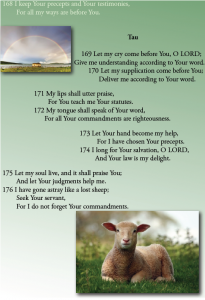 And so we reach, at last, the end of our psalm. Those who have read, have studied, have prayed with the psalmist from the start, will find in this last stanza many familiar thoughts. J.A. Alexander remarks that verse 175 “Sums up in conclusion the petitions of the whole psalm”; and indeed, the whole Tau section is a fitting summation of all that has come before.
And so we reach, at last, the end of our psalm. Those who have read, have studied, have prayed with the psalmist from the start, will find in this last stanza many familiar thoughts. J.A. Alexander remarks that verse 175 “Sums up in conclusion the petitions of the whole psalm”; and indeed, the whole Tau section is a fitting summation of all that has come before.
The section consists of four pairs of verses (the grouping of the first two pairs being much more obvious than the others). In these verses we see the themes that have dominated the author’s thoughts from the beginning:
In verses 169-170 we hear again the psalmist’s two oft-repeated requests, for wisdom and deliverance. “Once more he prays for fuller understanding or discernment, and for the freedom of outward circumstance which will enable him to use it” (A.F. Kirkpatrick). “The psalmist asked for understanding and deliverance,” says Warren Wiersbe, “for he knew that the truth would set him free (John 8:32).”
Overflowing praise (from lips and tongue) is the subject of the next pair of verses–praise “for God’s continuous teaching” and for “the substance of that teaching” (Kirkpatrick again). The word translated “utter” in verse 171 has the sense of “pour forth” or “flow”, as reflected in many English translations. Of course, the ideas of speaking and flowing are not mutually exclusive–perhaps the most apt image
for the praise described here would be that of a “babbling brook.”
The third pair of verses once again pleads for God’s help, with the utmost confidence that it will be provided to the one who trusts in Him and has thus “renounced all other forms of protection” (Alexander). As verse 155 speaks of the wicked who will not experience salvation because they have searched for it in the wrong places, so here salvation is sure, because the psalmist has searched for it in the one place it can truly be found.
The psalm ends with a humble plea from one who knows all too well the human tendency to stray from God. The verse is something of a surprise; throughout the psalm, its author has repeatedly stressed his determination to follow the law (vs.8), and his practice of following it (vs. 22, 110). But as Derek Kidner notes, “The confession of failure is not inconsistent with the profession of devotion.”
And though this may be the first verse in which the psalmist recognizes that he has stepped out of God’s ways, in its humility we recognize the heart of him who has written the 175 verses before it, in which he “may be seen exerting himself but is never to be seen trusting himself” (George J. Zemek). “This man would have taken his stance not with the self-congratulatory Pharisee of the parable,” says Kidner, “but with the publican who stood afar off, but went home justified.”
The last word in our study comes from Alexander Maclaren. On vs. 176:
The psalmist prayed ‘Seek They servant,’ for he knew how continually he would be tempted to stray. But we know better than he did how wonderfully the answer has surpassed his petition. ‘The Son of Man is come to seek and to save that which was lost.’
And on 175:
Life drawn from God, turned to God in continual praise, and invigorated by unfailing helps ministered through His uttered will, is the only life worth living.
Rainbow image courtesy of Evgeni Diney / FreeDigitalPhotos.net
Lamb image courtesy of James Barker / FreeDigitalPhotos.net
